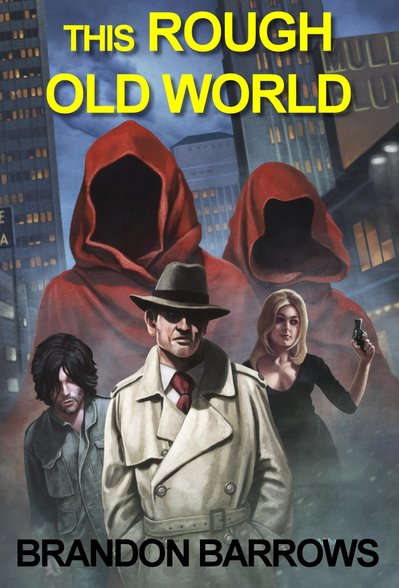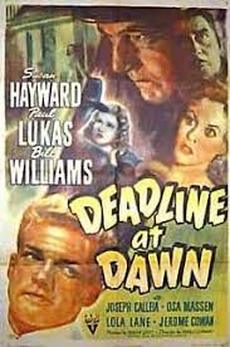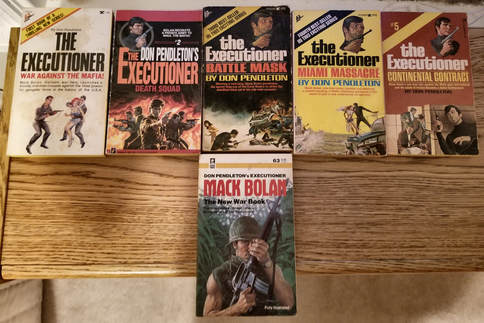Posted without comment.
|
Recently, a friend nominated me for one of those "post the covers of seven books you love, one a day, without comment or explanation" deals on Facebook. Tuesday was the final day, so I thought I'd share them here, as well. Posted without comment.
0 Comments
As happens, I was looking for something else and stumbled across this movie. It didn't catch my interest based on what I'd read about it, until I saw it was based on a novel of the same name, by William Irish, which was a pseudonym of Cornell Woolrich, one of the masters of noir. The story is a variant on the classic noir plot, "Did I do it?" in which a sailor, Alex, wakes up in NYC from a night of drinking to find he's considerably cash-richer than he was. He only barely remembers the night, but does remember a mysterious woman gave him the cash.
In seeking to find her and return the money, Alex, discovers his dubious benefactor, Edna, is dead and since he can't remember the night, he himself is an obvious suspect. With the help of a dance-hall girl, June, Alex sets out to find out who really killed Edna. The title comes from the fact that he has only a few hours before he needs to catch a bus to report to his naval station for duty. Now, any time you stumble across a minor noir film, there's always people claiming it's a masterpiece and the public just doesn't understand it. This isn't a masterpiece, but it's unusual, for the time, in that the main "detective" is a woman - June. Now, June is not your typical noir frail, neither is she a femme fatale. Instead, she embodies the kind of world-weariness you usually see in cops or P.I.s. The world is terrible and she's just along for the ride because she has no choice, although in her case, her jadedness comes from her lot in life as a dance-hall girl--constantly being hit on by strange men, etc--it's no less real than that of the men who usually lead these films. Why, then, does she take pity on Alex? Well, you get the feeling that he's just big and dumb and innocent-looking enough that she takes pity on him and maybe thinks he's even slightly worse off than she is. After that, she takes the lead and they get things done. The movie itself isn't anything particularly special: a lot of wandering around, talking to people (almost at random) piecing together clues. Edna, it seems, was in the blackmail business and finally crossed the wrong person. Same old story, right? Well, it's a B-movie certainly, but not cheaply nor unskillfully made. From what I've read, this was director Harold Clurman's first and only film, and it's obvious that he put time and consideration into it, rather than just hacking it out and what he ended up with, while not spectacularly, is perfectly solid - especially for a first effort. For that alone, I think it deserves to be remembered. In 1969, writer Don Pendleton published his novel War Against the Mafia, a novel of a Vietnam vet's (initially) one-man war against the Mafia, in retaliation for their tangential killing of his parents and sister. Mack Bolan, the Executioner, sounds very Punisheresque, no? Well, that's because he's actually the direct inspiration for the Punisher, per creator Gerry Conway, though less-well known by the public. Pendleton certainly made his mark, however, as, in addition to the 38 Executioner novels he wrote himself, more than five-hundred additional novels have been written by various writers and published under published by Gold Eagle (a division of Harlequin). Read on. Despite the massive number of these books published, you may never have seen one. Until the demise of Gold Eagle, they weren't to be found in any bookstore I've ever been in. But, if you've examined the miniscule books section of a K-Mart or Walmart, you've probably seen these books: tiny, cheap paperback novels. For years, I saw and ignored them. They look, to be brutally honest, cheap and tawdry and bottom-barrel.
Last summer, out of curiosity, I purchased the first, the original novel. It was a little better than I expected, but not much. The story is fairly ridiculous and Pendleton's prose is terrible, but I can see how it would appeal to a certain market. I read it then put it on the shelf and forgot about it. Recently, however, in a box of free books someone was throwing out after a garage sale, amidst tomes on wildlife and hunting and fishing, I found the above books: the first five Executioner novels, plus a later book--Mack Bolan's War Book--that contains a rough chronology of the first 60-some-odd novels, plus lists of weapons he's used and character he's met. I rarely turn down free books, so I scooped them up. I've re-read the first novel and read the second one now and I have to say, my opinion of the books is actually worse than before. They are silly to the point of nearly being parody of tough-guy heroes with more bullets than brains. I know, from his own writings on the matter, though, that Pendleton did not intend them as such. He saw his character as an American version of James Bond - tough and principled and unwilling to bend from his own code of honor. He also, of course, called himself "the father of action adventure fiction", as if pulp heroes like Doc Savage, The Avenger and the Shadow didn't exist before he was even born. These books are not intellectual and they are barely literate--thoough some later novels, by other writers, are apparently much better, I'm told--but I can see the market they were meant for and obviously they were insanely successful in the long-run. I don't know of any other book series with 500+ entries. If nothing else, Pendleton left his mark on the world. |
Brandon BarrowsI'm Brandon and I write comic books, prose and poetry. I own dozens of clever and interesting t-shirts. Archives
July 2024
Categories
All
|











 RSS Feed
RSS Feed